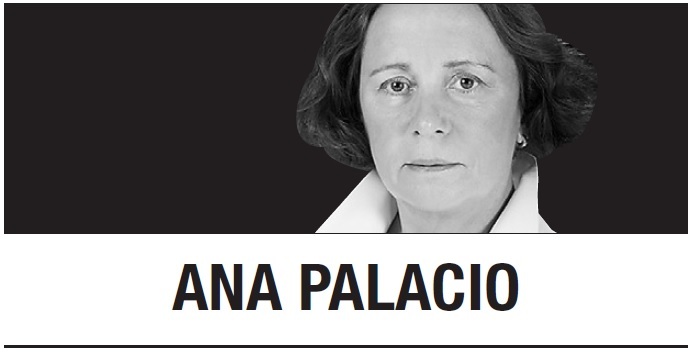
When the European Union’s foreign ministers convene on Feb. 22, they will have to confront the political fallout from the ill-fated visit to Moscow by Josep Borrell, the EU’s High Representative for Foreign Affairs and Security Policy. One hopes that the reckoning catalyzes much-needed progress toward developing a coherent European Russia policy.
The timing of Borrell’s visit to Moscow -- the first by an EU official since 2017 – was odd, to say the least. In the weeks before he arrived, Russian opposition leader Alexei Navalny had returned to Russia from Germany, where he had been recovering since last August from what was most likely a Kremlin-ordered poisoning. Navalny did not even make it out of the airport before he was arrested.
After hasty and farcical court proceedings, Navalny was sentenced to nearly three years in a penal colony. This touched off a wave of protests -- and a wave of repression by the Kremlin. Police have detained thousands of demonstrators, often using excessive force.
Borrell went to Moscow anyway. In his view, by “putting aside negative rhetoric,” the visit would be a “good starting point for frank EU-Russia dialogue.” The logic is not altogether wrong. As German Chancellor Angela Merkel acknowledged in the trip’s aftermath, the EU has a “diplomatic duty” to keep channels of communication with Russia open.
But seeking a reset with the Kremlin from anything other than a position of strength is a recipe for disaster. Borrell learned this the hard way at a joint press conference in Moscow, when Russian Foreign Minister Sergey Lavrov called the EU an “unreliable partner” and accused its leaders of lying about Navalny’s poisoning.
While Lavrov delivered his performance -- clearly intended for Russian viewers -- the apparently stunned Borrell stood by silently. Then, to add insult to injury, the Kremlin expelled three European diplomats from Russia for allegedly attending demonstrations in support of Navalny -- a decision Borrell learned about while in a meeting with Lavrov.
Upon his return to Brussels, Borrell faced heavy criticism in the European Parliament, with over 70 MEPs calling for his resignation over what they termed “humiliating developments.” Borrell defended his decision to visit Moscow, despite the “obvious risks,” arguing that he “wanted to test whether the Russian authorities are interested in a serious attempt to reverse the deterioration of our relations.”
Now that it is clear they are not, Borrell added, he would make “concrete proposals” for increased sanctions, to be discussed at the Feb. 22 meeting. He also participated in a video call with other EU officials, Navalny’s chief of staff, Leonid Volkov, and the executive director of Navalny’s Anti-Corruption Foundation, Vladimir Ashurkov, to discuss next steps.
But, whatever those steps are, they should extend well beyond confronting Russia for last week’s events. After all, the fiasco is merely a symptom of a much deeper problem: The EU lacks a strategic vision, especially toward Russia.
For Europe, Russia has long been like a matryoshka doll: familiar and surprising, simple and intricate, recognizable and inscrutable. Or, as Winston Churchill famously put it in 1939, Russia is “a riddle, wrapped in a mystery, inside an enigma.” But, in his less-remembered next sentence, Churchill identified the key to deciphering it: the Russian national interest.
Nobody knows this better than Russian President Vladimir Putin, who has built his political career on convincing Russians that their interests are best served by his leadership. Putin has long portrayed the dissolution of the Soviet Union as part of a Western plot to undermine and sideline Russia, spinning a tale of humiliation that conveniently ignored domestic failures. Standing up to the West and restoring Russia’s status as an indispensable world power, Putin’s tale continues, is essential to correct this injustice -- and only Putin can do the job.
This revanchist approach was exemplified by Russia’s 2014 annexation of Crimea, which Putin portrayed as an effort to right historic wrongs and a reasonable response to NATO’s eastward expansion. His approval rating soared by 20 percentage points.
Moreover, Putin is well aware of Europe’s strategic disarray. While the United States at least merits the respect of being treated as the Kremlin’s arch-nemesis, the EU has been the object of caricature in Russia’s heavily controlled media, as Lavrov’s treatment of Borrell revealed. Discrediting the European model has been tactically useful for Putin -- and, so far, costless. In fact, even as European leaders berated Borrell, Germany reaffirmed its support for one of Putin’s signature projects: the Nord Stream 2 pipeline, which will supply gas directly from Russia.
To keep from being outplayed, Europe must get its act together. That means not only paying lip service to shared strategic goals, but also taking coordinated action to realize them. Perhaps Borrell’s disastrous Moscow visit -- together with US President Joe Biden’s pledge that the days of “rolling over in the face of Russia’s aggressive actions” are over -- will provide the impetus Europe needs.
Ana Palacio
Ana Palacio, a former minister of foreign affairs of Spain and former senior vice president and general counsel of the World Bank Group, is a visiting lecturer at Georgetown University. -- Ed.
(Project Syndicate)








